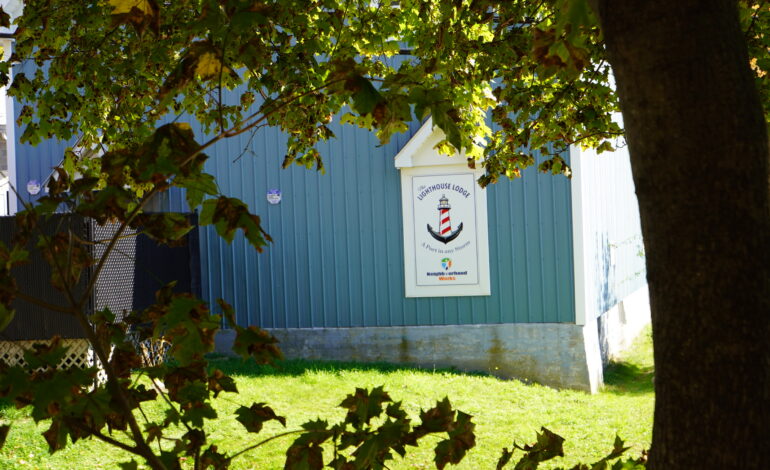
When Peter Fitch looks down from his second-floor bedroom, it doesn’t take him long to see something that makes him feel uneasy.
Fitch owns the home right across from Lighthouse Lodge, the shelter for unhoused people in St. Stephen.
“I think most of us would say the same thing, that we are very concerned about the folks that are staying there,” he said, speaking to The Courier. “We want them to be out of the cold, for sure, but we’ve had a great disruption in our life.”
He said there have been nights he and his wife have awoken to screaming in the courtyard, just several hundred metres from their front door.
“It feels like this shelter was kind of crowbarred into this space,” he said.
In December 2023, the Municipal District of St. Stephen (MDSS) declared a state of emergency over the growing number of people experiencing homelessness in the small community along the Canada-U.S. border.
It was later rescinded by the then-public safety minister Kris Austin.
How the shelter operates
A month later, a proposed homeless shelter on Happy Valley Road was put on “pause” by the Progressive Conservative government of the day over concerns from area residents, who said it was too close to the local high school, businesses, and raised fears over increased crime.
In November 2024, the new Liberal government announced that 9 Main Street would be the location of a new permanent shelter for the area. Fitch said the neighbouring properties were invited to an open house two days before it opened the doors.
“I do believe that this group has done everything to try and make it better, as they have put up a fence, which helps people walking by, [but] it doesn’t help us,” he said.
The shelter has 20 regular beds and 10 overflow beds. It is considered a “wet shelter,” meaning people who are inebriated by drugs or alcohol can stay there.

It operates under the harm reduction model, which deploys safer use, managed use, abstinence, meeting people “where they’re at” and addressing conditions of use along with use itself, according to the National Harm Reduction Coalition.
Fitch describes moments of intense violence.
“What I can’t live with is men screaming the worst obscenities in our language at women … We witnessed a group of people sitting beside the shelter, and a man came running from the shelter, knocked one of the women to the ground, started beating her, then started kicking her in the head. When we started screaming at him to stop and screaming at the staff members to get over to where everybody actually was, instead of the courtyard property of the shelter, the man started screaming obscenities at us.”
He said he feels you cannot help one group of people while harming another.
Fellow resident Stacy Arseneault has similar feelings. He lives down the street from the shelter.
“What we’re noticing is quality of life, since this was opened in November, [that] has changed dramatically,” he said in an interview with The Courier.
Arseneault said he feels unsafe — a feeling he wasn’t expecting when he moved home to St. Stephen from out of province. He was able to meet with Social Development Minister Cindy Miles, which has given the residents some hope.
But they have yet to be able to present to MDSS during a regular meeting of council.
“We want to be sitting at the table and have some transparency with the municipality, but they are not returning our calls,” he said.
Both Fitch and Arseneault said they understand housing and homelessness are under the provincial mandate, but add they only wish to be heard by their local representatives.
The group petitioned the council through a lawyer to make their presentation.
The Courier reached out to MDSS Mayor Allan MacEachern, but he declined to comment citing an ongoing legal petition on the group’s request to present.
Frustration over communication
Arseneault said there is a frustration that has been brewing in the community.
“There doesn’t seem to be any collaboration,” he said. “Everything seems to be happening behind closed doors.”
A new municipal plan that is under review by the local government and the public said it wishes to approach homelessness “in a fair and compassionate manner.”
It also seeks to work with non-profit partners and the provincial government to “phase out the existing emergency shelter site and zone locations for any future temporary emergency shelters based upon the policy of the municipal plan or through a site-specific rezoning and consultation.”

This plan has not been adopted by the council and would need to consider the feedback collected through public consultation before coming to a vote for adoption.
The St. Stephen detachment of the RCMP said 16 calls for service were attached directly to the shelter’s address in September.
Three calls were also recorded in the immediate area of the shelter, bringing the total for the month to 19.
Fitch and Arseneault both feel the approach to solving this issue is trauma-informed and multi-pronged.
Finding the right balance
Julia Woodhall-Melnik, an association professor of social science at the University of New Brunswick based in Saint John, said we haven’t thought of homelessness as being a rural problem.
“Over the past few years, especially post COVID-19 and during COVID-19, we’ve seen increased vulnerability in renters in small places and even homeowners in small places,” she said in an interview with The Courier. “[They] are struggling with things like mortgage rate hikes, increased taxes, increased cost of living, and when it [also] comes to things like food costs.”
She said many people looked to smaller more rural communities during the pandemic for a quieter way of life, but incomes have not kept pace with rents and mortgages.
Woodhall-Melnik said not all rural communities have the variety of resources present in larger cities like Saint John, Moncton and Fredericton – like access to food programs, multiple shelters, housing supports, harm reduction supplies and mental health resources.

Small communities also don’t receive the proper funding from other levels of government needed to operate more robust programming.
She understands the perceptions and concerns raised by those living near the shelter.
“We shouldn’t just be laughing off or shoving off community members’ experiences or their feelings and concerns about the fact their community is changing,” she said.
Ultimately, Woodhall-Melnik said a shelter is better than people dying in the streets or in wooded areas – but the balance is tricky.
“Folks work hard to maintain their households,” she said. “I do have sympathy for that … I’m always a big fan of, instead of saying no, enthusiastically say yes, but ask for what your community needs.”
Each community is different, she said, but if there is concern about individuals wandering around the community at night or during the day – it should be a question of how do we create a place for those unhoused individuals to go that has the right funding and resources to ensure their needs are met.
These include: allowing spaces like public libraries with computers for individuals to use, day-programs with activities, employment assistance programs, social assistance and mental health resources.
“The only reason why we stigmatize the homeless population is because there is no door to close,” she said.
Woodhall-Melnik said if the concern is safety, the question must become, how do we address that problem at its root.
“We need to help these individuals, we can’t not, but in doing so we don’t want to harm other societies either,” she explained.
Dealing with the root causes of homelessness and mental health, she added, will not immediately result in change but will result in a healthier community.
She said there has to be strong leadership from the various levels of government to address both sides of this problem.
“If I was social development, I would be out knocking on doors of folks who are in the neighbourhood that is slated for a shelter and saying, ‘OK, what are your concerns, and I’m going to listen to them,’” she said.
Woodhall-Melnik believes municipalities have not been set up for success when it comes to dealing with this crisis.

“I run into my local councillor at the grocery store all the time, and he often says to me that this is something that has spiraled out of control of what he thought he would have to deal with as a city councillor,” she said. “He was hoping to work on bylaws for the city, waste disposal, traffic mitigation, all of that stuff. Now it’s become dealing with a life or death crisis.
“This is a new reality for New Brunswick municipalities.”
She said unlike Ontario, where there are more resources for municipalities to deal with housing and homelessness, it does not exist in New Brunswick.
“Their role is really advocacy and then it is to reduce red tap to building, and to identify land that can be used, but to advocate for both their citizens who are housed and unhoused.
Status quo “unacceptable”
“We really do need to see bold leadership and listening. People need to be heard through this crisis, and it’s the only way we’re going to weather the storm and still maintain communities that are functional, compassionate and work toward a better sense of equity.”
David Hickey, the minister responsible for housing, said he does understand that both the people living in homelessness, around it and working in it feel the status quo is “unacceptable.”
“I think what I’ll say is it’s critical to have buy-in from everybody that is involved,” he said speaking with The Courier. “That’s really what led us to the decision of saying we need a centralized task force that offers clarity to New Brunswickers on who is making the decisions and who is setting the vision on this.”
He said if things are not working on the ground in St. Stephen, the government needs to be nimble enough to respond to those issues.
“NWI and the staff at The Lodge are committed to safety, respect, and open communication.” — statement by NWI Board of Directors
The task force is a ministerial one, which includes Hickey, Social Development Minister Cindy Miles, Justice Minister Rob McKee – who is also responsible for addictions and mental health – Public Safety Minister Robert Gauvin and Local Government Minister Aaron Kennedy.
“The hope is to try and do things a little differently from the way that they’ve been done before, so that there is community buy-in and so that we can build clarity on this, so that people can see an impact in the communities that have been dealing with visible homelessness in ways we’ve never seen before,” Hickey explained.
He said there is a funding announcement coming “to set the tone for how we see a reduction of visible homelessness in the community,” in the next few weeks.
Hickey explained the provincial government will be leaning on municipalities and asking them to provide the best context for the situation the community finds itself in.
“We need to be able to support mayors and councils in those local communities,” he said.
Neighbourhood Works Inc (NW), the non-profit organization responsible for overseeing the Lighthouse Lodge, said in a statement from its board of directors that it cares deeply about the wellbeing and safety of everyone in the town – both those who live and work in the shelter and those who live and work around it.
“The Lodge does not tolerate violent or unsafe behaviour,” the statement said. “Such behaviour is always met with sanctions—with staff following clear policies and procedures. Depending on the incident, someone may lose access to the shelter for a designated time.”
It said they also use the opportunity to teach people about “safety, the respectful treatment of others, and the importance of healthy coping and communication strategies,” adding if someone is barred from the facility, an outreach team is meeting these individuals in community.
It said when the open house was held by NWI, only five people attended.
“Since then, our managers and staff have responded to every call and email from neighbours,” it said in the statement. “NWI has taken concerns about noise, trespassing, and drug use seriously and acted on them where it can in conjunction with the RCMP, municipal authorities and the province according to the law.”
It said homelessness is a complex issue and no municipality can fix it, but it adds new safety measures and staffing supports as needs arise.
“Guests at the shelter have an urgent need for access to detox and rehabilitation programs; however, these provincial services are not currently available in our region,” it said in the statement. “NWI and the staff at The Lodge are committed to safety, respect, and open communication. We know the Lodge presents difficulties and sometimes negatively affects the immediate neighbours. We are committed to seeking solutions in collaboration with our community, caring for those who need shelter, and being transparent and responsive with our fellow residents of St. Stephen as we move forward together.”
The next committee meeting for MDSS is scheduled for Oct. 15.




